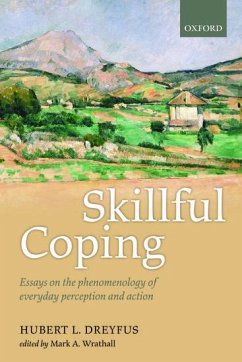Hubert L DreyfusEssays on the Phenomenology of Everyday Perception and Action
Skillful Coping
Essays on the Phenomenology of Everyday Perception and Action
Herausgeber: Wrathall, Mark A
Hubert L DreyfusEssays on the Phenomenology of Everyday Perception and Action
Skillful Coping
Essays on the Phenomenology of Everyday Perception and Action
Herausgeber: Wrathall, Mark A
- Broschiertes Buch
- Merkliste
- Auf die Merkliste
- Bewerten Bewerten
- Teilen
- Produkt teilen
- Produkterinnerung
- Produkterinnerung
For fifty years Hubert Dreyfus has done pioneering work which brings phenomenology and existentialism to bear on the philosophical and scientific study of the mind. This is a selection of his most influential essays, developing his critique of the representational model of the mind in analytical philosophy of mind and mainstream cognitive science.
Andere Kunden interessierten sich auch für
![Human Being, Bodily Being Human Being, Bodily Being]() Chakravarthi Ram-PrasadHuman Being, Bodily Being31,99 €
Chakravarthi Ram-PrasadHuman Being, Bodily Being31,99 €![Tertium Organum Tertium Organum]() P D OuspenskyTertium Organum20,99 €
P D OuspenskyTertium Organum20,99 €![Phenomenology and Philosophy of Mind Phenomenology and Philosophy of Mind]() David Woodruff Smith / Amie L. Thomasson (eds.)Phenomenology and Philosophy of Mind66,99 €
David Woodruff Smith / Amie L. Thomasson (eds.)Phenomenology and Philosophy of Mind66,99 €![Piaget Philosophy and the Human Sciences Piaget Philosophy and the Human Sciences]() Hugh J SilvermanPiaget Philosophy and the Human Sciences29,99 €
Hugh J SilvermanPiaget Philosophy and the Human Sciences29,99 €![The Healing Body The Healing Body]() Drew LederThe Healing Body27,99 €
Drew LederThe Healing Body27,99 €![Body, Community, Language, World Body, Community, Language, World]() Jan PatockaBody, Community, Language, World19,99 €
Jan PatockaBody, Community, Language, World19,99 €![Hegel's Transcendental Induction Hegel's Transcendental Induction]() Peter SimpsonHegel's Transcendental Induction33,99 €
Peter SimpsonHegel's Transcendental Induction33,99 €-
-
-
For fifty years Hubert Dreyfus has done pioneering work which brings phenomenology and existentialism to bear on the philosophical and scientific study of the mind. This is a selection of his most influential essays, developing his critique of the representational model of the mind in analytical philosophy of mind and mainstream cognitive science.
Produktdetails
- Produktdetails
- Verlag: Oxford University Press
- Seitenzahl: 304
- Erscheinungstermin: 25. Oktober 2016
- Englisch
- Abmessung: 233mm x 154mm x 20mm
- Gewicht: 471g
- ISBN-13: 9780198777298
- ISBN-10: 0198777299
- Artikelnr.: 47867907
- Herstellerkennzeichnung
- Libri GmbH
- Europaallee 1
- 36244 Bad Hersfeld
- gpsr@libri.de
- Verlag: Oxford University Press
- Seitenzahl: 304
- Erscheinungstermin: 25. Oktober 2016
- Englisch
- Abmessung: 233mm x 154mm x 20mm
- Gewicht: 471g
- ISBN-13: 9780198777298
- ISBN-10: 0198777299
- Artikelnr.: 47867907
- Herstellerkennzeichnung
- Libri GmbH
- Europaallee 1
- 36244 Bad Hersfeld
- gpsr@libri.de
Hubert L. Dreyfus is Professor of Philosophy in the Graduate School at the University of California, Berkeley. His research interests bridge the Analytic and Continental traditions in twentieth-century philosophy focusing on non-conceptual intentional content in skilled action and in perception. He is author of What Computers (Still) Can't Do (MIT, 1992) and Being-in-the-World: A Commentary on Heidegger's Being and Time, Division I (MIT, 1991). Mark A. Wrathall is Professor of Philosophy at the University of California, Riverside. He is the author of Heidegger and Unconcealment: Truth, Language and History (CUP, 2010) and the editor of The Cambridge Companion to Heidegger's Being and Time (CUP, 2013).
* Introduction: Hubert Dreyfus and the Phenomenology of Human
Intelligence
* Section One: The phenomenology of skills
* 1: From Socrates to Expert Systems: The Limits of Calculative
Rationality (with Stuart E. Dreyfus) (1985)
* Section Two: Intentionality and Mind
* 2: The Perceptual Noema: Gurwitsch's Crucial Contribution (1972)
* 3: Heidegger's Critique of the Husserl/Searle Account of
Intentionality (1993)
* 4: Todes's Account of Nonconceptual Perceptual Knowledge and Its
Relation to Thought (2001)
* 5: Overcoming the Myth of the Mental: How Philosophers Can Profit
from the Phenomenology of Everyday Expertise (2005)
* Section Three: Phenomenology and the Human Sciences
* 6: Holism and Hermeneutics (1980)
* 7: The Primacy of Phenomenology over Logical Analysis (2001)
* 8: From Depth Psychology to Breadth Psychology: A Phenomenological
Approach to Psychopathology (with Jerome Wakefield) (1988)
* 9: What is Moral Maturity? Towards A Phenomenology of Ethical
Expertise (with Stuart E. Dreyfus) (1992)
* Section Four: Embodied Coping and Artificial Intelligence
* 10: Making a Mind Versus Modeling the Brain: Artificial Intelligence
Back at a Branchpoint (with Stuart E. Dreyfus) (1988)
* 11: Merleau-Ponty and Recent Cognitive Science (2004)
* 12: Why Heideggerian AI Failed and How Fixing it Would Require Making
it More Heideggerian (2007)
* Bibliography
* Index
Intelligence
* Section One: The phenomenology of skills
* 1: From Socrates to Expert Systems: The Limits of Calculative
Rationality (with Stuart E. Dreyfus) (1985)
* Section Two: Intentionality and Mind
* 2: The Perceptual Noema: Gurwitsch's Crucial Contribution (1972)
* 3: Heidegger's Critique of the Husserl/Searle Account of
Intentionality (1993)
* 4: Todes's Account of Nonconceptual Perceptual Knowledge and Its
Relation to Thought (2001)
* 5: Overcoming the Myth of the Mental: How Philosophers Can Profit
from the Phenomenology of Everyday Expertise (2005)
* Section Three: Phenomenology and the Human Sciences
* 6: Holism and Hermeneutics (1980)
* 7: The Primacy of Phenomenology over Logical Analysis (2001)
* 8: From Depth Psychology to Breadth Psychology: A Phenomenological
Approach to Psychopathology (with Jerome Wakefield) (1988)
* 9: What is Moral Maturity? Towards A Phenomenology of Ethical
Expertise (with Stuart E. Dreyfus) (1992)
* Section Four: Embodied Coping and Artificial Intelligence
* 10: Making a Mind Versus Modeling the Brain: Artificial Intelligence
Back at a Branchpoint (with Stuart E. Dreyfus) (1988)
* 11: Merleau-Ponty and Recent Cognitive Science (2004)
* 12: Why Heideggerian AI Failed and How Fixing it Would Require Making
it More Heideggerian (2007)
* Bibliography
* Index
* Introduction: Hubert Dreyfus and the Phenomenology of Human
Intelligence
* Section One: The phenomenology of skills
* 1: From Socrates to Expert Systems: The Limits of Calculative
Rationality (with Stuart E. Dreyfus) (1985)
* Section Two: Intentionality and Mind
* 2: The Perceptual Noema: Gurwitsch's Crucial Contribution (1972)
* 3: Heidegger's Critique of the Husserl/Searle Account of
Intentionality (1993)
* 4: Todes's Account of Nonconceptual Perceptual Knowledge and Its
Relation to Thought (2001)
* 5: Overcoming the Myth of the Mental: How Philosophers Can Profit
from the Phenomenology of Everyday Expertise (2005)
* Section Three: Phenomenology and the Human Sciences
* 6: Holism and Hermeneutics (1980)
* 7: The Primacy of Phenomenology over Logical Analysis (2001)
* 8: From Depth Psychology to Breadth Psychology: A Phenomenological
Approach to Psychopathology (with Jerome Wakefield) (1988)
* 9: What is Moral Maturity? Towards A Phenomenology of Ethical
Expertise (with Stuart E. Dreyfus) (1992)
* Section Four: Embodied Coping and Artificial Intelligence
* 10: Making a Mind Versus Modeling the Brain: Artificial Intelligence
Back at a Branchpoint (with Stuart E. Dreyfus) (1988)
* 11: Merleau-Ponty and Recent Cognitive Science (2004)
* 12: Why Heideggerian AI Failed and How Fixing it Would Require Making
it More Heideggerian (2007)
* Bibliography
* Index
Intelligence
* Section One: The phenomenology of skills
* 1: From Socrates to Expert Systems: The Limits of Calculative
Rationality (with Stuart E. Dreyfus) (1985)
* Section Two: Intentionality and Mind
* 2: The Perceptual Noema: Gurwitsch's Crucial Contribution (1972)
* 3: Heidegger's Critique of the Husserl/Searle Account of
Intentionality (1993)
* 4: Todes's Account of Nonconceptual Perceptual Knowledge and Its
Relation to Thought (2001)
* 5: Overcoming the Myth of the Mental: How Philosophers Can Profit
from the Phenomenology of Everyday Expertise (2005)
* Section Three: Phenomenology and the Human Sciences
* 6: Holism and Hermeneutics (1980)
* 7: The Primacy of Phenomenology over Logical Analysis (2001)
* 8: From Depth Psychology to Breadth Psychology: A Phenomenological
Approach to Psychopathology (with Jerome Wakefield) (1988)
* 9: What is Moral Maturity? Towards A Phenomenology of Ethical
Expertise (with Stuart E. Dreyfus) (1992)
* Section Four: Embodied Coping and Artificial Intelligence
* 10: Making a Mind Versus Modeling the Brain: Artificial Intelligence
Back at a Branchpoint (with Stuart E. Dreyfus) (1988)
* 11: Merleau-Ponty and Recent Cognitive Science (2004)
* 12: Why Heideggerian AI Failed and How Fixing it Would Require Making
it More Heideggerian (2007)
* Bibliography
* Index








